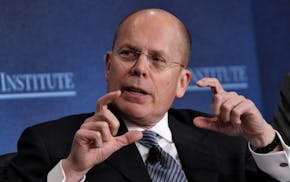University of Minnesota President Rebecca Cunningham on Monday accused the federal government of launching a "direct attack" on her institution's public service mission by cutting funding to equip and maintain its research facilities.
U leaders huddled this past weekend to figure out how to respond to Friday's announcement that the National Institutes of Health (NIH) would limit the "indirect" support it gives to academic institutions along with direct financing of research. In a Monday memo to U staff and students, Cunningham said the university plans to fight the cuts by lobbying lawmakers and publicizing the consequences of the reduced funding.
"This decision would cut reimbursements for research facilities and administrative costs, which cover critical, lifesaving research activities ranging from patient safety to research security," she wrote. "It would no doubt have serious consequences for patients across the state, as well as our students, faculty and staff."
Minnesota Attorney General Keith Ellison joined with colleagues from 21 other states Monday to sue the federal government in an attempt to block the funding cut. Ellison said in a statement "it's against the law" for the Trump administration to toss aside agreements negotiated individually with grant recipients for their indirect costs. Later Monday, federal U.S. District Court judge Angel Kelley in Massachusetts temporarily blocked the cuts from taking effect and set a hearing for Feb. 21 to determine the legality and way to proceed.
Friday's decision by the Trump administration caught academic leaders off guard, capping NIH's indirect support to no more than 15% on top of the grants it issues to research institutions.
Minnesota stands to lose more than $117 million, based on the nearly $630 million in NIH funding its institutions received in 2024, according to an analysis by a policy leader at Education Reform Now. The analysis suggests more than $60 million in funding is at risk for the U and more than $50 million for Mayo Clinic in Rochester.
The cut is part of President Donald Trump's rapid-fire series of efforts in his first month in office to reduce federal spending. Academic institutions sometimes request indirect funding of 27% to 60% of their NIH research grants, according to an NIH memo, and yet they often accept grants from private foundations that include little or no indirect support.
"NIH is obligated to carefully steward grant awards to ensure taxpayer dollars are used in ways that benefit the American people and improve their quality of life," the memo said. "Indirect costs are, by their very nature, 'not readily assignable to the cost objectives specifically benefitted' and are therefore difficult for NIH to oversee."
Academic institutions have relied on this federal financial support to maintain their research facilities, and their leaders argued in turn, they have produced lifesaving treatments and spawned a biotech industry that has grown the U.S. economy. Suddenly cutting that funding upends a partnership between the federal government and academic institutions that has existed for decades, said Ted Mitchell, president of the American Council on Education.
"This decision is short-sighted, naïve and dangerous," he wrote. "It will be celebrated wildly by our competitors, who will see this for what it is — a surrender of U.S. supremacy in medical research."
U.S. Sen. Amy Klobuchar, D-Minn., supported the lawsuit to stop the cut and said in a statement "this illegal move endangers critical clinical studies and research and extinguishes hope for so many Americans looking for cures."
Indirect funding has been a sore spot for the federal government in the past. The inspector general for U.S. Health and Human Services highlighted problems in 2022 with negotiations about indirect payment agreements, including an understaffed department approving contracts with "unallowable" expenses and incorrect payment rates.
The U of M has assembled publicly available information for years to explain and protect its indirect financial support. One recent infographic warned that a funding cut could result in less research or higher tuition to make up the difference.
Dr. Peter Crawford, vice dean for research at the U of M Medical School, said he was already thinking about how to cut corners on equipment maintenance and replacement hires for his NIH-funded lab, which studies the chemical predictors that predispose people to obesity-related complications.
The U worked for more than a decade to get back into the top 30 of NIH-funded institutions, he added, which means these cuts will hit Minnesota particularly hard.
The dispute about indirect funding is but the latest pitting states and research institutions against Trump's budget-cutting efforts. The Trump administration issued a broader freeze on federal grants and loans late last month as well.
Chief Judge John J. McConnell Jr. of the U.S. District Court in Rhode Island issued a restraining order last month suspending that action and a follow-up ruling Monday after Democratic attorneys general claimed the administration was ignoring the initial ruling and still holding up some federal payments.er
The Associated Press contributed to this report.

UnitedHealth sues the Guardian, alleging defamation in coverage of nursing home care

Prices for international flights drop as major airlines navigate choppy economic climate
Minnesota's med spa industry rises in popularity — and with little regulation

Hundreds line up at Best Buy to nab Nintendo Switch 2, in scene like '90s opening parties

